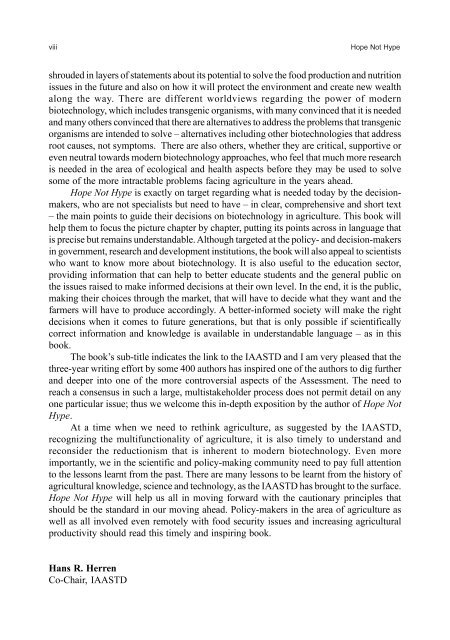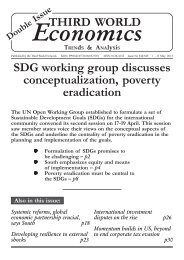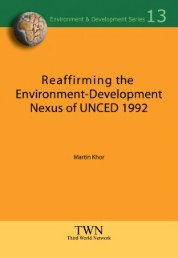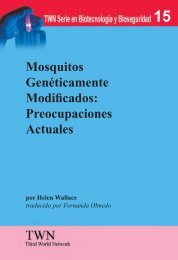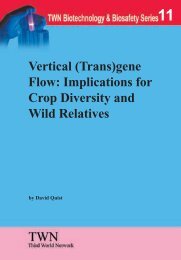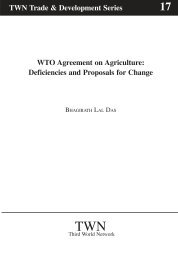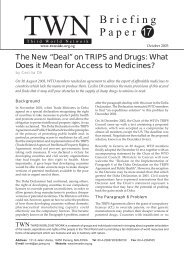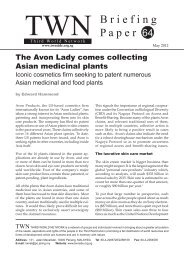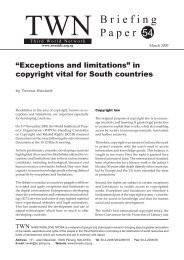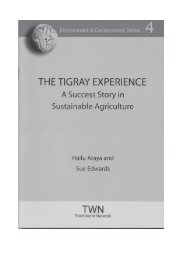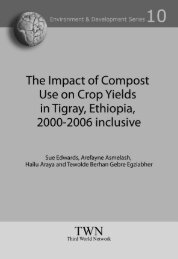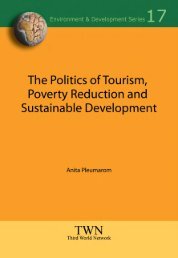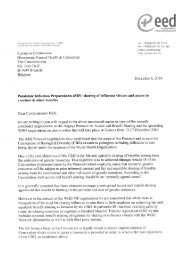Hope Not Hype - Third World Network
Hope Not Hype - Third World Network
Hope Not Hype - Third World Network
- No tags were found...
Create successful ePaper yourself
Turn your PDF publications into a flip-book with our unique Google optimized e-Paper software.
viii<br />
<strong>Hope</strong> <strong>Not</strong> <strong>Hype</strong><br />
shrouded in layers of statements about its potential to solve the food production and nutrition<br />
issues in the future and also on how it will protect the environment and create new wealth<br />
along the way. There are different worldviews regarding the power of modern<br />
biotechnology, which includes transgenic organisms, with many convinced that it is needed<br />
and many others convinced that there are alternatives to address the problems that transgenic<br />
organisms are intended to solve – alternatives including other biotechnologies that address<br />
root causes, not symptoms. There are also others, whether they are critical, supportive or<br />
even neutral towards modern biotechnology approaches, who feel that much more research<br />
is needed in the area of ecological and health aspects before they may be used to solve<br />
some of the more intractable problems facing agriculture in the years ahead.<br />
<strong>Hope</strong> <strong>Not</strong> <strong>Hype</strong> is exactly on target regarding what is needed today by the decisionmakers,<br />
who are not specialists but need to have – in clear, comprehensive and short text<br />
– the main points to guide their decisions on biotechnology in agriculture. This book will<br />
help them to focus the picture chapter by chapter, putting its points across in language that<br />
is precise but remains understandable. Although targeted at the policy- and decision-makers<br />
in government, research and development institutions, the book will also appeal to scientists<br />
who want to know more about biotechnology. It is also useful to the education sector,<br />
providing information that can help to better educate students and the general public on<br />
the issues raised to make informed decisions at their own level. In the end, it is the public,<br />
making their choices through the market, that will have to decide what they want and the<br />
farmers will have to produce accordingly. A better-informed society will make the right<br />
decisions when it comes to future generations, but that is only possible if scientifically<br />
correct information and knowledge is available in understandable language – as in this<br />
book.<br />
The book’s sub-title indicates the link to the IAASTD and I am very pleased that the<br />
three-year writing effort by some 400 authors has inspired one of the authors to dig further<br />
and deeper into one of the more controversial aspects of the Assessment. The need to<br />
reach a consensus in such a large, multistakeholder process does not permit detail on any<br />
one particular issue; thus we welcome this in-depth exposition by the author of <strong>Hope</strong> <strong>Not</strong><br />
<strong>Hype</strong>.<br />
At a time when we need to rethink agriculture, as suggested by the IAASTD,<br />
recognizing the multifunctionality of agriculture, it is also timely to understand and<br />
reconsider the reductionism that is inherent to modern biotechnology. Even more<br />
importantly, we in the scientific and policy-making community need to pay full attention<br />
to the lessons learnt from the past. There are many lessons to be learnt from the history of<br />
agricultural knowledge, science and technology, as the IAASTD has brought to the surface.<br />
<strong>Hope</strong> <strong>Not</strong> <strong>Hype</strong> will help us all in moving forward with the cautionary principles that<br />
should be the standard in our moving ahead. Policy-makers in the area of agriculture as<br />
well as all involved even remotely with food security issues and increasing agricultural<br />
productivity should read this timely and inspiring book.<br />
Hans R. Herren<br />
Co-Chair, IAASTD


